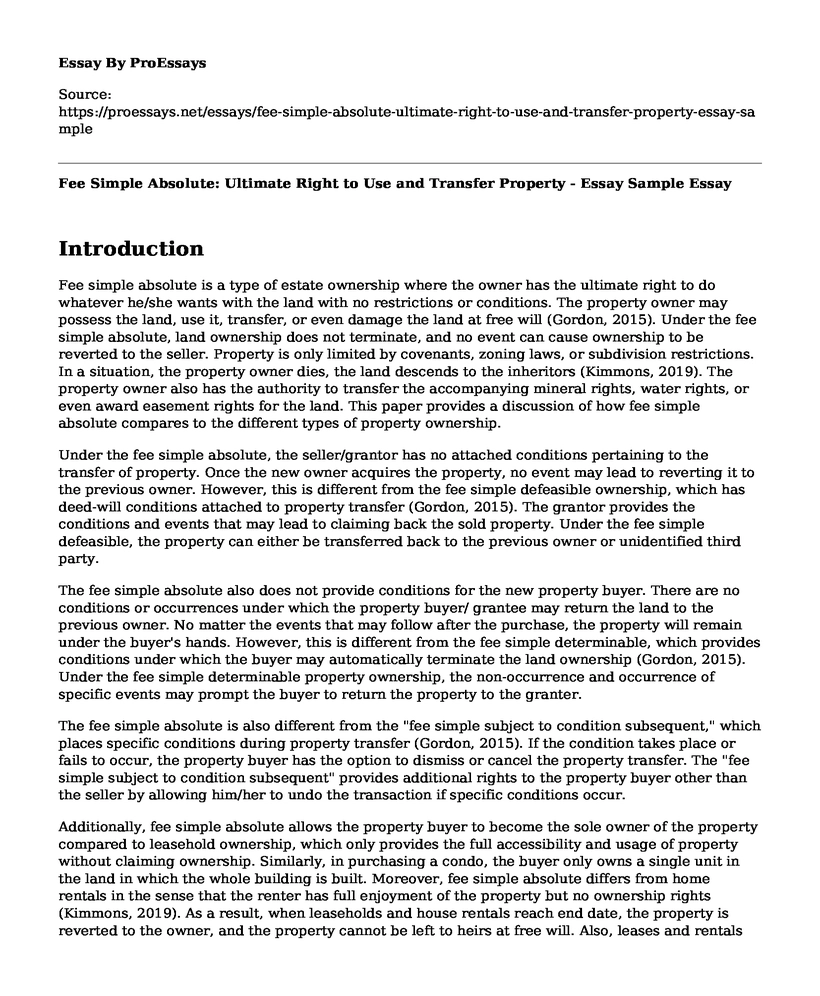Introduction
Fee simple absolute is a type of estate ownership where the owner has the ultimate right to do whatever he/she wants with the land with no restrictions or conditions. The property owner may possess the land, use it, transfer, or even damage the land at free will (Gordon, 2015). Under the fee simple absolute, land ownership does not terminate, and no event can cause ownership to be reverted to the seller. Property is only limited by covenants, zoning laws, or subdivision restrictions. In a situation, the property owner dies, the land descends to the inheritors (Kimmons, 2019). The property owner also has the authority to transfer the accompanying mineral rights, water rights, or even award easement rights for the land. This paper provides a discussion of how fee simple absolute compares to the different types of property ownership.
Under the fee simple absolute, the seller/grantor has no attached conditions pertaining to the transfer of property. Once the new owner acquires the property, no event may lead to reverting it to the previous owner. However, this is different from the fee simple defeasible ownership, which has deed-will conditions attached to property transfer (Gordon, 2015). The grantor provides the conditions and events that may lead to claiming back the sold property. Under the fee simple defeasible, the property can either be transferred back to the previous owner or unidentified third party.
The fee simple absolute also does not provide conditions for the new property buyer. There are no conditions or occurrences under which the property buyer/ grantee may return the land to the previous owner. No matter the events that may follow after the purchase, the property will remain under the buyer's hands. However, this is different from the fee simple determinable, which provides conditions under which the buyer may automatically terminate the land ownership (Gordon, 2015). Under the fee simple determinable property ownership, the non-occurrence and occurrence of specific events may prompt the buyer to return the property to the granter.
The fee simple absolute is also different from the "fee simple subject to condition subsequent," which places specific conditions during property transfer (Gordon, 2015). If the condition takes place or fails to occur, the property buyer has the option to dismiss or cancel the property transfer. The "fee simple subject to condition subsequent" provides additional rights to the property buyer other than the seller by allowing him/her to undo the transaction if specific conditions occur.
Additionally, fee simple absolute allows the property buyer to become the sole owner of the property compared to leasehold ownership, which only provides the full accessibility and usage of property without claiming ownership. Similarly, in purchasing a condo, the buyer only owns a single unit in the land in which the whole building is built. Moreover, fee simple absolute differs from home rentals in the sense that the renter has full enjoyment of the property but no ownership rights (Kimmons, 2019). As a result, when leaseholds and house rentals reach end date, the property is reverted to the owner, and the property cannot be left to heirs at free will. Also, leases and rentals have no ultimate rights for the tenants, as some even prohibit pets' ownership.
References
Gordon, J. M. (2015, January 8). Fee Simple - Definition & Explanation. The Business Professor. https://thebusinessprofessor.com/knowledge-base/fee-simple-defined/
Kimmons, J. (2019, November 11). A Real Estate Agent's Guide to Fee Simple Ownership. The Balance Small Business. https://www.thebalancesmb.com/fee-simple-ownership-in-real-estate-2866601
Cite this page
Fee Simple Absolute: Ultimate Right to Use and Transfer Property - Essay Sample. (2023, Apr 24). Retrieved from https://proessays.net/essays/fee-simple-absolute-ultimate-right-to-use-and-transfer-property-essay-sample
If you are the original author of this essay and no longer wish to have it published on the ProEssays website, please click below to request its removal:
- International vs. U.S. Standards
- The Legal Framework of International Investment Protection
- BOC Group Case Study Analysis
- Evaluation of the Financial Performance of Tesco Plc.
- Paper Example on Comparing Capital Expenditure of Apple Inc. and Samsung
- Essay Sample on Gender-Based Crime Trends & Statistics
- Ex-Convicts Reentering Society: Challenges & Solutions - Essay Sample







